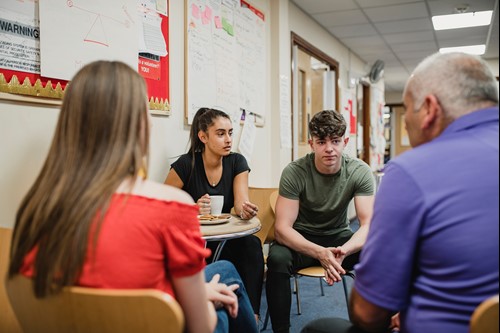A research team supported by ARC North Thames and PenARC, and led by our Mental Health lead Professor Peter Fonagy, has been awarded a UK Prevention Research Partnership (UKPRP) Consortium award of £5.3 million for a project that aims to improve adolescent mental health in disadvantaged communities.

Evidence shows that people of lower socioeconomic status have a higher likelihood of developing and experiencing mental health problems. There is also evidence to suggest that young people who were struggling financially before the pandemic will be worse off, leading to more difficulties that will further impact on their mental health.
Named ‘Kailo’. from the Proto-Indo European word which means connected or whole, the project will bring together:
- Leading mental health researchers, system modellers and evaluators from University College London (UCL), ARC North Thames, Exeter University and ARC South West Peninsula (PenARC);
- Social researchers and designers from Dartington Service Design Lab and Shift; and
- Voluntary sector mental health practitioners from the Anna Freud National Centre for Children and Families and Redthread.
- An Expert Advisory Group co-chaired by Professor Sir Michael Marmot (Director of the UCL Institute of Health Equity) and Dame Rachel de Souza (Children’s Commissioner for England).
The funding will support a multidisciplinary team of leading scientists and practitioners working alongside communities to develop locally tailored strategies to combat the underlying causes of mental ill health in their area.
During the initial phase of the five-year initiative, Kailo will be trialled in two distinct communities experiencing differing forms of disadvantage: North Devon, an area which is rural and sparsely populated, and Newham in East London, an area of dense urban population. The research will test the feasibility of Kailo across these contexts, so that the model can be refined and implemented more widely in subsequent years.
Professor Peter Fonagy, Head of the Division of Psychology and Language Sciences at UCL and ARC North Thames Mental Health Lead will be the Research Director of Kailo. He said:
“The pandemic has placed an unprecedented strain on young people’s mental health and even before the pandemic evidence suggests that poor mental health is on the rise in this group. We know all too well that impact and disadvantage are not equally felt in society – young people from minoritized and economically disadvantaged groups suffer the most. Here is an opportunity to design something innovative to address this pernicious problem.”
Professor Tim Hobbs, Kailo Co-Director and Chief Executive from Dartington Service Design Lab, said:
“The current system for addressing mental ill health has developed to be reactive, under the strain of limited resources. This means that a response is often triggered only when a problem becomes severe. This new, connected approach will support practitioners and community leaders to work with young people and families to co-design evidence-informed and locally tailored strategies designed to address the underlying causes of mental ill health in their area.”
The UKPRP funding is part of a wider £50m multi-funder initiative to improve population health and reduce health inequalities.
About the Kailo programme
This work was supported by the UK Prevention Research Partnership, which is funded by the British Heart Foundation, Chief Scientist Office of the Scottish Government Health and Social Care Directorates, Engineering and Physical Sciences Research Council, Economic and Social Research Council, Health and Social Care Research and Development Division (Welsh Government), Medical Research Council, National Institute for Health Research, Natural Environment Research Council, Public Health Agency (Northern Ireland), The Health Foundation and Wellcome.

 26 Jul 2021
26 Jul 2021
